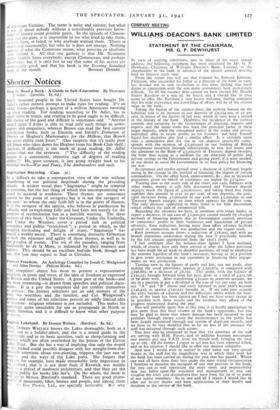Shorter Notices SIXTY thousand people in the United States have
bought Dr. Adler's rather earnest attempt to make rules for reading. It's an awful vision—perhaps a quarter of a. million Americans swotting up their reading. For reading, according to Dr. Adler, has as many rules as tennis, and reading to be good ought to be difficult. His choice of the good and difficult is sometimes odd. "Anyone wouki agree if Jones is able to read only such things as news- papers and magazines whereas Brown can read the best current non-fiction books, such as Einstein and Infold's Evolution of Physics or Hogben's Mathematics for the Million, that Brown has more ability than Jones." (One suspects that it's really poor old Jones who takes down his Hogben from his Book Club shelf.) Anyway, if difficulty is the mark of good reading, Dr. Adler passes—but not the reviewer. (" The difficulty of the reading matter is a convenient, objective sign of degrees of reading ability.") He, poor creature, is just going straight back to his fictional trash—War and Peace, The Ambassadors and such.






























 Previous page
Previous page